Critical Appraisal of Qualitative Research on Medication Errors
VerifiedAdded on 2022/09/21
|6
|1537
|22
Report
AI Summary
This report provides a critical appraisal of two qualitative research studies concerning medication administration errors. The first study, by Keers (2018), investigates the causes of medication administration errors in a mental health hospital, focusing on the experiences of nursing staff. It examines the influence of experience, staff mix, and guidelines on error rates, identifying disruptive circumstances, staffing issues, and communication problems as contributing factors. The second study, by Björkstén (2016), analyzes medication errors as malpractice, focusing on nurses' perspectives and identifying individual and systematic factors. The appraisal highlights the strengths, such as the in-depth qualitative approach and recognition of behavioral factors, while also noting weaknesses, including reliance on older literature and a lack of quantitative data. Both studies address the ethical concerns surrounding medication errors and provide valuable insights into improving patient safety and healthcare practices. The report critically evaluates the methodologies, findings, and implications of both studies, offering a comprehensive overview of the research landscape in this critical area.
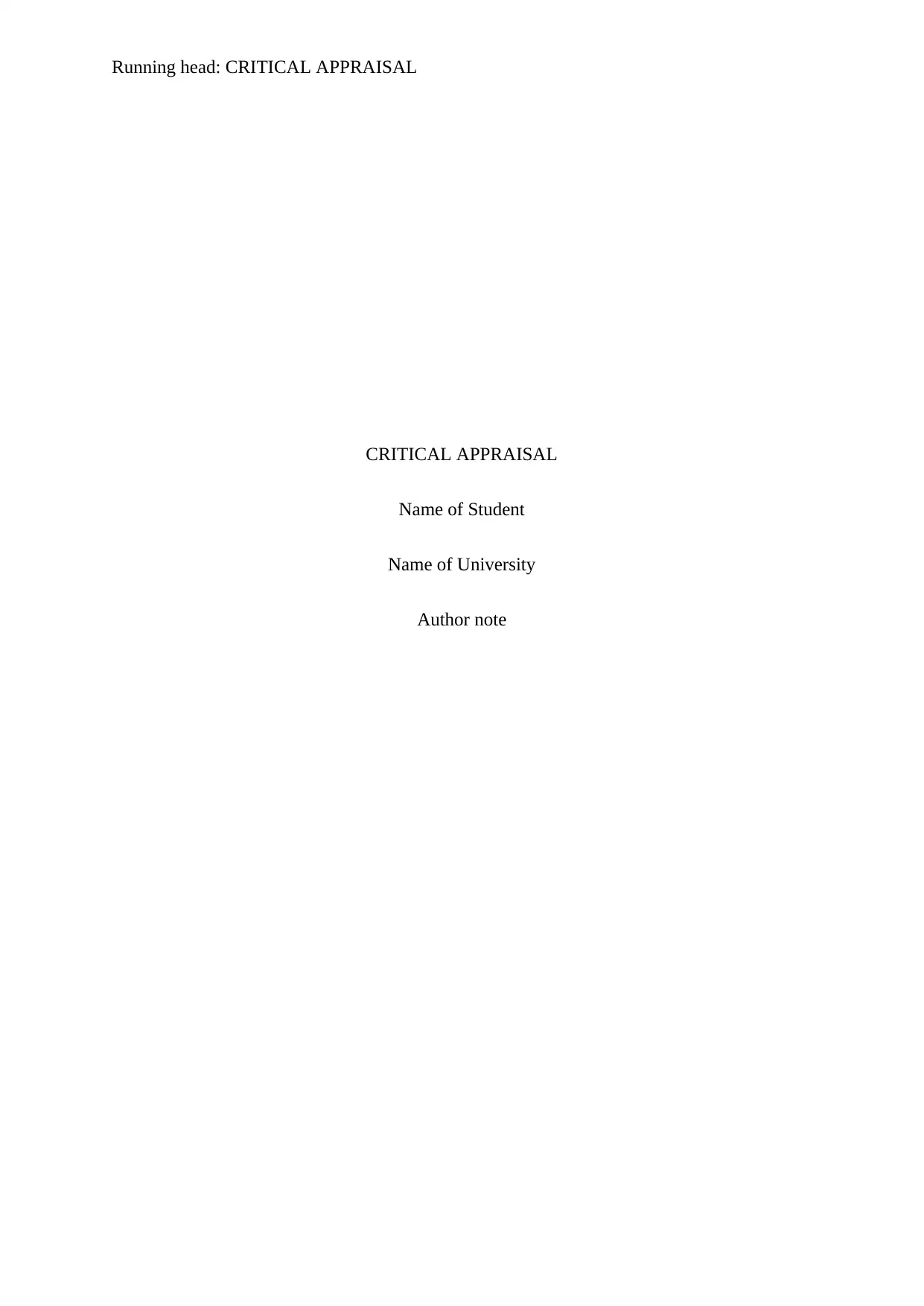
Running head: CRITICAL APPRAISAL
CRITICAL APPRAISAL
Name of Student
Name of University
Author note
CRITICAL APPRAISAL
Name of Student
Name of University
Author note
Paraphrase This Document
Need a fresh take? Get an instant paraphrase of this document with our AI Paraphraser
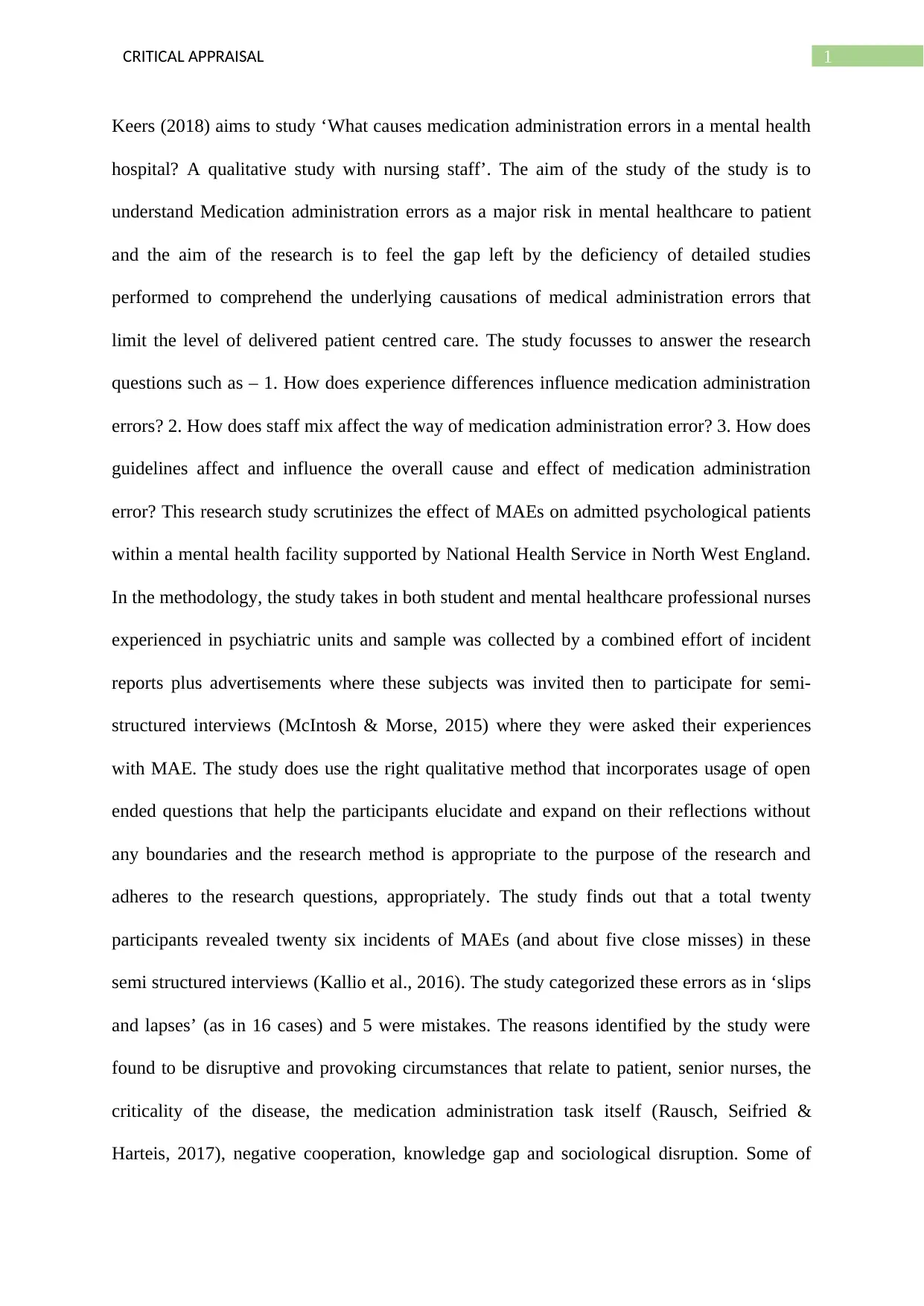
1CRITICAL APPRAISAL
Keers (2018) aims to study ‘What causes medication administration errors in a mental health
hospital? A qualitative study with nursing staff’. The aim of the study of the study is to
understand Medication administration errors as a major risk in mental healthcare to patient
and the aim of the research is to feel the gap left by the deficiency of detailed studies
performed to comprehend the underlying causations of medical administration errors that
limit the level of delivered patient centred care. The study focusses to answer the research
questions such as – 1. How does experience differences influence medication administration
errors? 2. How does staff mix affect the way of medication administration error? 3. How does
guidelines affect and influence the overall cause and effect of medication administration
error? This research study scrutinizes the effect of MAEs on admitted psychological patients
within a mental health facility supported by National Health Service in North West England.
In the methodology, the study takes in both student and mental healthcare professional nurses
experienced in psychiatric units and sample was collected by a combined effort of incident
reports plus advertisements where these subjects was invited then to participate for semi-
structured interviews (McIntosh & Morse, 2015) where they were asked their experiences
with MAE. The study does use the right qualitative method that incorporates usage of open
ended questions that help the participants elucidate and expand on their reflections without
any boundaries and the research method is appropriate to the purpose of the research and
adheres to the research questions, appropriately. The study finds out that a total twenty
participants revealed twenty six incidents of MAEs (and about five close misses) in these
semi structured interviews (Kallio et al., 2016). The study categorized these errors as in ‘slips
and lapses’ (as in 16 cases) and 5 were mistakes. The reasons identified by the study were
found to be disruptive and provoking circumstances that relate to patient, senior nurses, the
criticality of the disease, the medication administration task itself (Rausch, Seifried &
Harteis, 2017), negative cooperation, knowledge gap and sociological disruption. Some of
Keers (2018) aims to study ‘What causes medication administration errors in a mental health
hospital? A qualitative study with nursing staff’. The aim of the study of the study is to
understand Medication administration errors as a major risk in mental healthcare to patient
and the aim of the research is to feel the gap left by the deficiency of detailed studies
performed to comprehend the underlying causations of medical administration errors that
limit the level of delivered patient centred care. The study focusses to answer the research
questions such as – 1. How does experience differences influence medication administration
errors? 2. How does staff mix affect the way of medication administration error? 3. How does
guidelines affect and influence the overall cause and effect of medication administration
error? This research study scrutinizes the effect of MAEs on admitted psychological patients
within a mental health facility supported by National Health Service in North West England.
In the methodology, the study takes in both student and mental healthcare professional nurses
experienced in psychiatric units and sample was collected by a combined effort of incident
reports plus advertisements where these subjects was invited then to participate for semi-
structured interviews (McIntosh & Morse, 2015) where they were asked their experiences
with MAE. The study does use the right qualitative method that incorporates usage of open
ended questions that help the participants elucidate and expand on their reflections without
any boundaries and the research method is appropriate to the purpose of the research and
adheres to the research questions, appropriately. The study finds out that a total twenty
participants revealed twenty six incidents of MAEs (and about five close misses) in these
semi structured interviews (Kallio et al., 2016). The study categorized these errors as in ‘slips
and lapses’ (as in 16 cases) and 5 were mistakes. The reasons identified by the study were
found to be disruptive and provoking circumstances that relate to patient, senior nurses, the
criticality of the disease, the medication administration task itself (Rausch, Seifried &
Harteis, 2017), negative cooperation, knowledge gap and sociological disruption. Some of
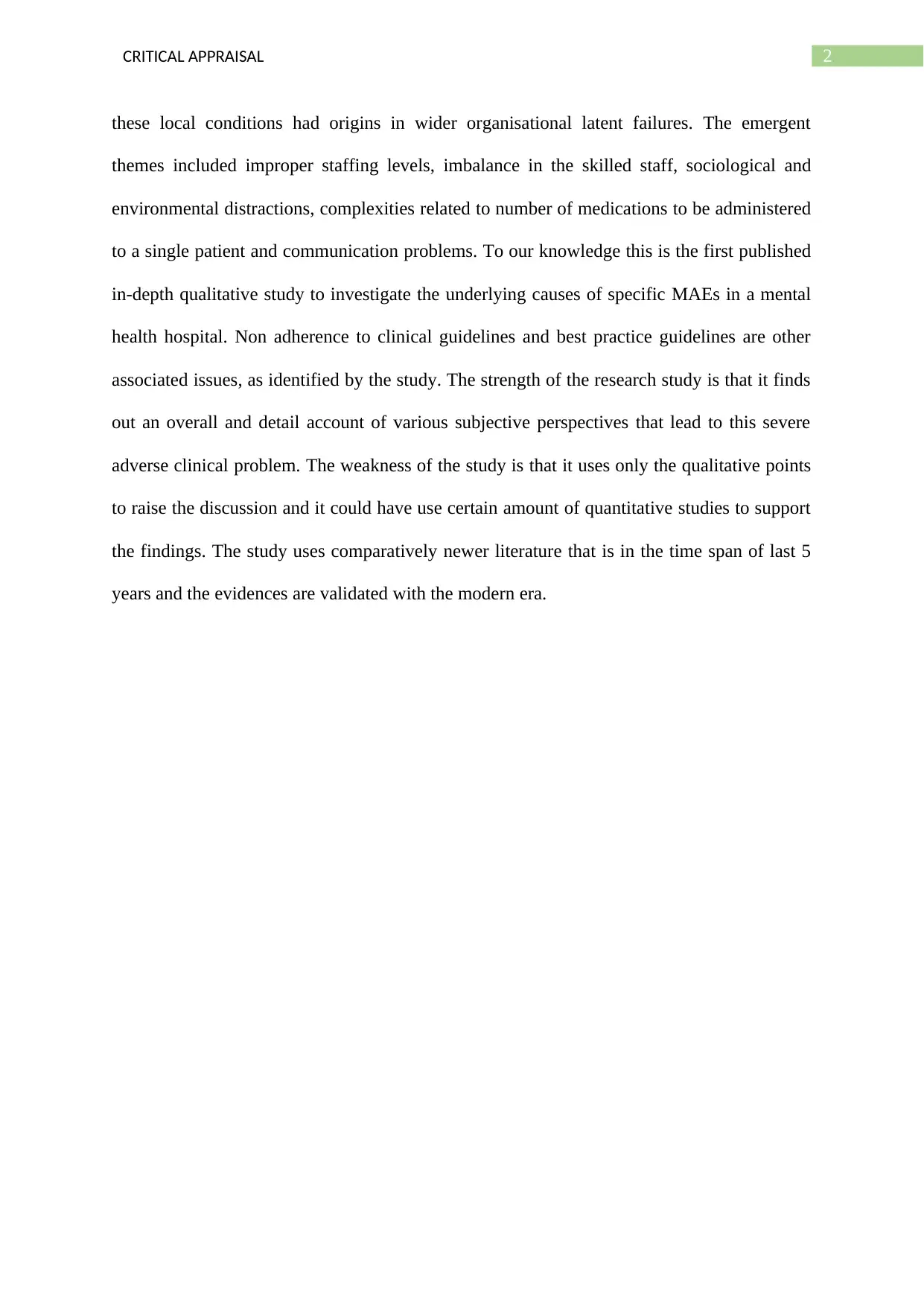
2CRITICAL APPRAISAL
these local conditions had origins in wider organisational latent failures. The emergent
themes included improper staffing levels, imbalance in the skilled staff, sociological and
environmental distractions, complexities related to number of medications to be administered
to a single patient and communication problems. To our knowledge this is the first published
in-depth qualitative study to investigate the underlying causes of specific MAEs in a mental
health hospital. Non adherence to clinical guidelines and best practice guidelines are other
associated issues, as identified by the study. The strength of the research study is that it finds
out an overall and detail account of various subjective perspectives that lead to this severe
adverse clinical problem. The weakness of the study is that it uses only the qualitative points
to raise the discussion and it could have use certain amount of quantitative studies to support
the findings. The study uses comparatively newer literature that is in the time span of last 5
years and the evidences are validated with the modern era.
these local conditions had origins in wider organisational latent failures. The emergent
themes included improper staffing levels, imbalance in the skilled staff, sociological and
environmental distractions, complexities related to number of medications to be administered
to a single patient and communication problems. To our knowledge this is the first published
in-depth qualitative study to investigate the underlying causes of specific MAEs in a mental
health hospital. Non adherence to clinical guidelines and best practice guidelines are other
associated issues, as identified by the study. The strength of the research study is that it finds
out an overall and detail account of various subjective perspectives that lead to this severe
adverse clinical problem. The weakness of the study is that it uses only the qualitative points
to raise the discussion and it could have use certain amount of quantitative studies to support
the findings. The study uses comparatively newer literature that is in the time span of last 5
years and the evidences are validated with the modern era.
⊘ This is a preview!⊘
Do you want full access?
Subscribe today to unlock all pages.

Trusted by 1+ million students worldwide
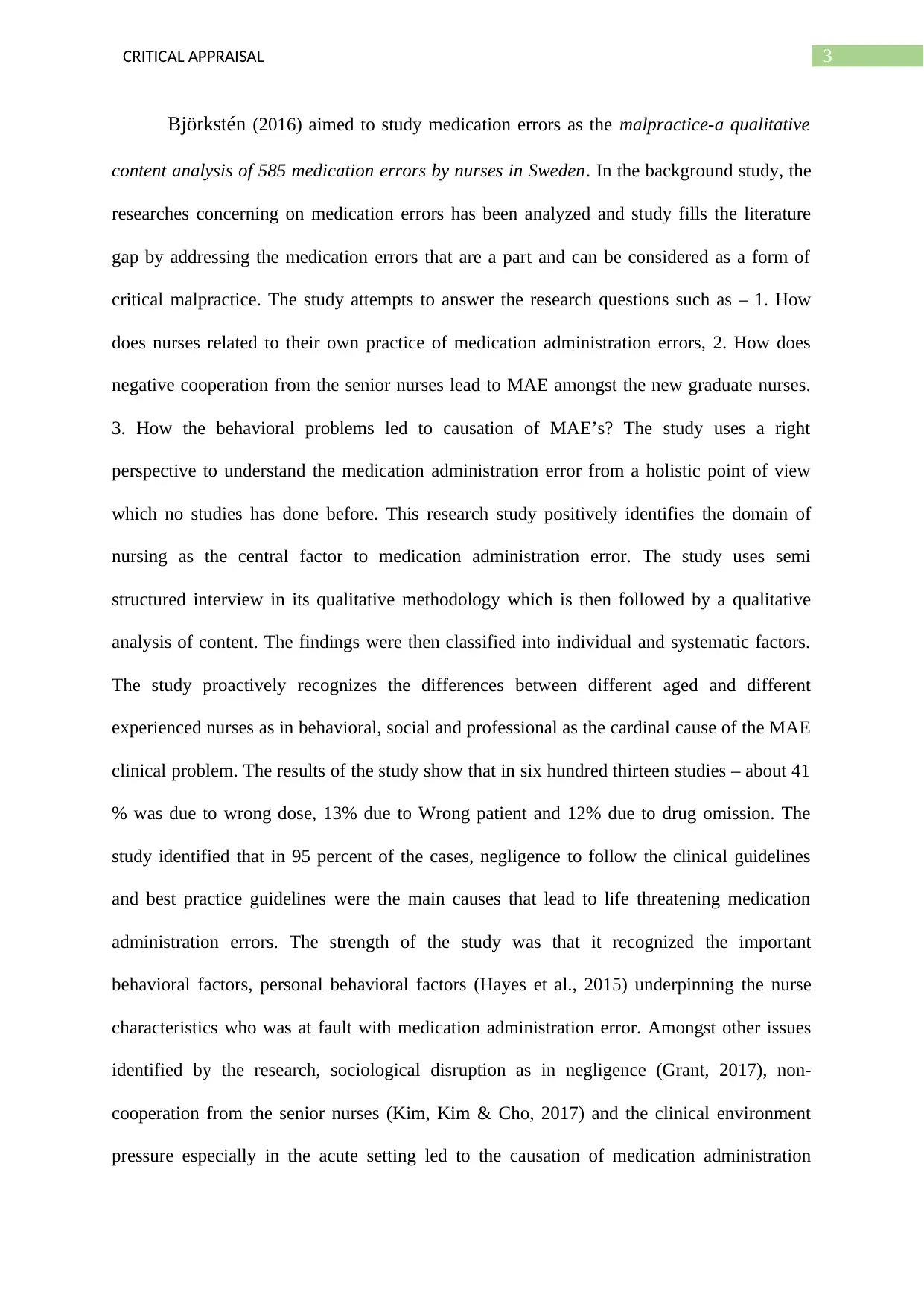
3CRITICAL APPRAISAL
Björkstén (2016) aimed to study medication errors as the malpractice-a qualitative
content analysis of 585 medication errors by nurses in Sweden. In the background study, the
researches concerning on medication errors has been analyzed and study fills the literature
gap by addressing the medication errors that are a part and can be considered as a form of
critical malpractice. The study attempts to answer the research questions such as – 1. How
does nurses related to their own practice of medication administration errors, 2. How does
negative cooperation from the senior nurses lead to MAE amongst the new graduate nurses.
3. How the behavioral problems led to causation of MAE’s? The study uses a right
perspective to understand the medication administration error from a holistic point of view
which no studies has done before. This research study positively identifies the domain of
nursing as the central factor to medication administration error. The study uses semi
structured interview in its qualitative methodology which is then followed by a qualitative
analysis of content. The findings were then classified into individual and systematic factors.
The study proactively recognizes the differences between different aged and different
experienced nurses as in behavioral, social and professional as the cardinal cause of the MAE
clinical problem. The results of the study show that in six hundred thirteen studies – about 41
% was due to wrong dose, 13% due to Wrong patient and 12% due to drug omission. The
study identified that in 95 percent of the cases, negligence to follow the clinical guidelines
and best practice guidelines were the main causes that lead to life threatening medication
administration errors. The strength of the study was that it recognized the important
behavioral factors, personal behavioral factors (Hayes et al., 2015) underpinning the nurse
characteristics who was at fault with medication administration error. Amongst other issues
identified by the research, sociological disruption as in negligence (Grant, 2017), non-
cooperation from the senior nurses (Kim, Kim & Cho, 2017) and the clinical environment
pressure especially in the acute setting led to the causation of medication administration
Björkstén (2016) aimed to study medication errors as the malpractice-a qualitative
content analysis of 585 medication errors by nurses in Sweden. In the background study, the
researches concerning on medication errors has been analyzed and study fills the literature
gap by addressing the medication errors that are a part and can be considered as a form of
critical malpractice. The study attempts to answer the research questions such as – 1. How
does nurses related to their own practice of medication administration errors, 2. How does
negative cooperation from the senior nurses lead to MAE amongst the new graduate nurses.
3. How the behavioral problems led to causation of MAE’s? The study uses a right
perspective to understand the medication administration error from a holistic point of view
which no studies has done before. This research study positively identifies the domain of
nursing as the central factor to medication administration error. The study uses semi
structured interview in its qualitative methodology which is then followed by a qualitative
analysis of content. The findings were then classified into individual and systematic factors.
The study proactively recognizes the differences between different aged and different
experienced nurses as in behavioral, social and professional as the cardinal cause of the MAE
clinical problem. The results of the study show that in six hundred thirteen studies – about 41
% was due to wrong dose, 13% due to Wrong patient and 12% due to drug omission. The
study identified that in 95 percent of the cases, negligence to follow the clinical guidelines
and best practice guidelines were the main causes that lead to life threatening medication
administration errors. The strength of the study was that it recognized the important
behavioral factors, personal behavioral factors (Hayes et al., 2015) underpinning the nurse
characteristics who was at fault with medication administration error. Amongst other issues
identified by the research, sociological disruption as in negligence (Grant, 2017), non-
cooperation from the senior nurses (Kim, Kim & Cho, 2017) and the clinical environment
pressure especially in the acute setting led to the causation of medication administration
Paraphrase This Document
Need a fresh take? Get an instant paraphrase of this document with our AI Paraphraser
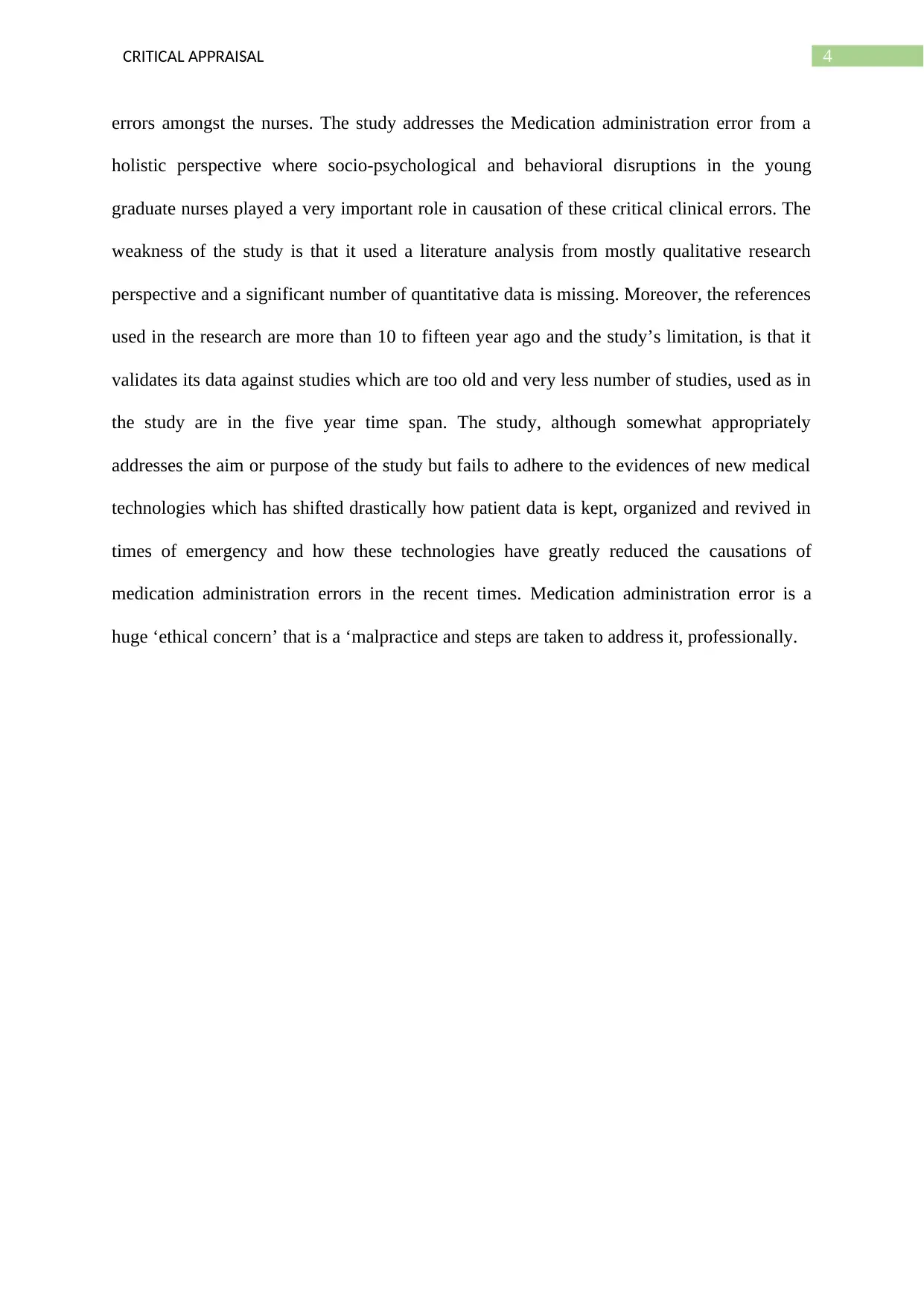
4CRITICAL APPRAISAL
errors amongst the nurses. The study addresses the Medication administration error from a
holistic perspective where socio-psychological and behavioral disruptions in the young
graduate nurses played a very important role in causation of these critical clinical errors. The
weakness of the study is that it used a literature analysis from mostly qualitative research
perspective and a significant number of quantitative data is missing. Moreover, the references
used in the research are more than 10 to fifteen year ago and the study’s limitation, is that it
validates its data against studies which are too old and very less number of studies, used as in
the study are in the five year time span. The study, although somewhat appropriately
addresses the aim or purpose of the study but fails to adhere to the evidences of new medical
technologies which has shifted drastically how patient data is kept, organized and revived in
times of emergency and how these technologies have greatly reduced the causations of
medication administration errors in the recent times. Medication administration error is a
huge ‘ethical concern’ that is a ‘malpractice and steps are taken to address it, professionally.
errors amongst the nurses. The study addresses the Medication administration error from a
holistic perspective where socio-psychological and behavioral disruptions in the young
graduate nurses played a very important role in causation of these critical clinical errors. The
weakness of the study is that it used a literature analysis from mostly qualitative research
perspective and a significant number of quantitative data is missing. Moreover, the references
used in the research are more than 10 to fifteen year ago and the study’s limitation, is that it
validates its data against studies which are too old and very less number of studies, used as in
the study are in the five year time span. The study, although somewhat appropriately
addresses the aim or purpose of the study but fails to adhere to the evidences of new medical
technologies which has shifted drastically how patient data is kept, organized and revived in
times of emergency and how these technologies have greatly reduced the causations of
medication administration errors in the recent times. Medication administration error is a
huge ‘ethical concern’ that is a ‘malpractice and steps are taken to address it, professionally.
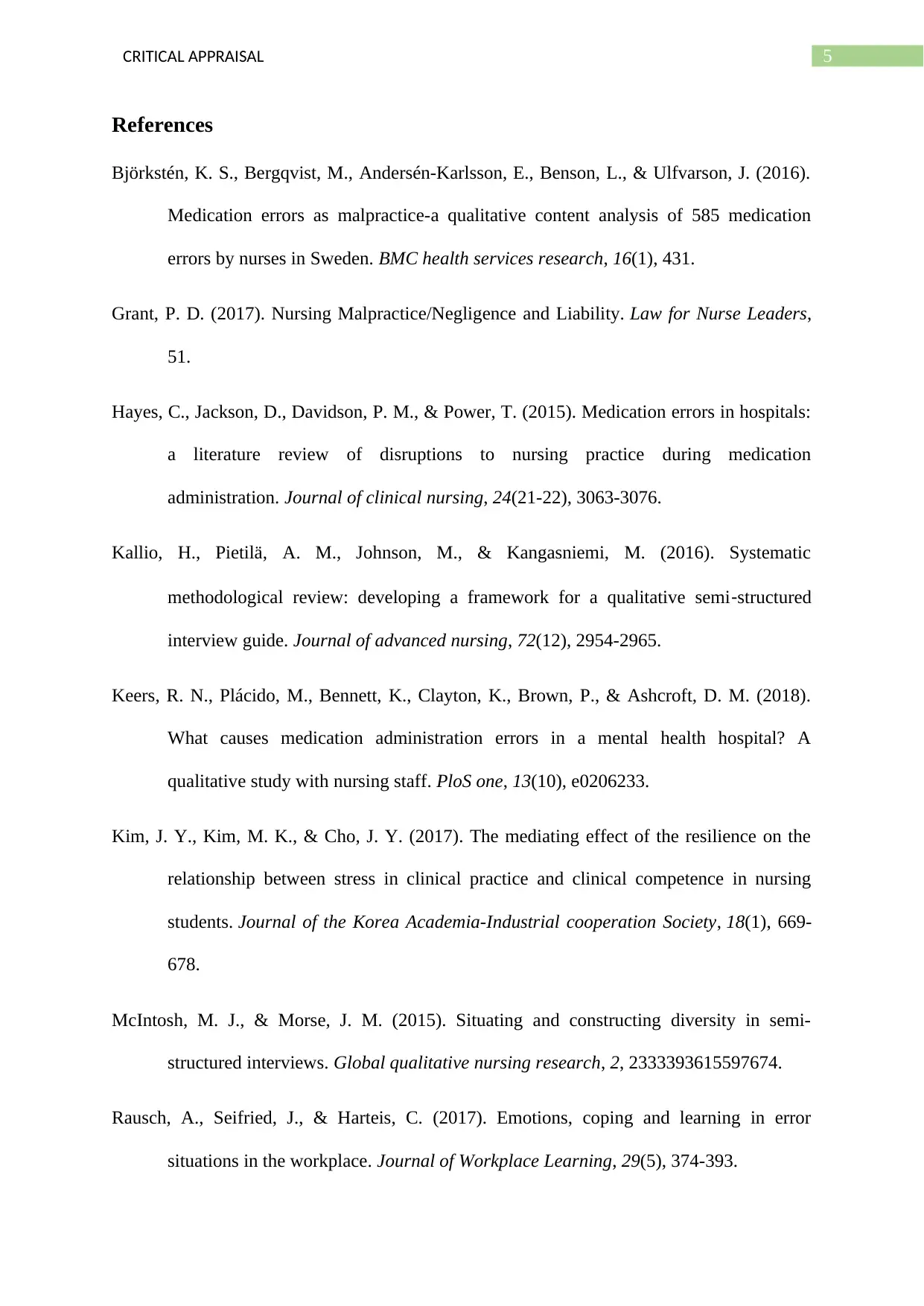
5CRITICAL APPRAISAL
References
Björkstén, K. S., Bergqvist, M., Andersén-Karlsson, E., Benson, L., & Ulfvarson, J. (2016).
Medication errors as malpractice-a qualitative content analysis of 585 medication
errors by nurses in Sweden. BMC health services research, 16(1), 431.
Grant, P. D. (2017). Nursing Malpractice/Negligence and Liability. Law for Nurse Leaders,
51.
Hayes, C., Jackson, D., Davidson, P. M., & Power, T. (2015). Medication errors in hospitals:
a literature review of disruptions to nursing practice during medication
administration. Journal of clinical nursing, 24(21-22), 3063-3076.
Kallio, H., Pietilä, A. M., Johnson, M., & Kangasniemi, M. (2016). Systematic
methodological review: developing a framework for a qualitative semi‐structured
interview guide. Journal of advanced nursing, 72(12), 2954-2965.
Keers, R. N., Plácido, M., Bennett, K., Clayton, K., Brown, P., & Ashcroft, D. M. (2018).
What causes medication administration errors in a mental health hospital? A
qualitative study with nursing staff. PloS one, 13(10), e0206233.
Kim, J. Y., Kim, M. K., & Cho, J. Y. (2017). The mediating effect of the resilience on the
relationship between stress in clinical practice and clinical competence in nursing
students. Journal of the Korea Academia-Industrial cooperation Society, 18(1), 669-
678.
McIntosh, M. J., & Morse, J. M. (2015). Situating and constructing diversity in semi-
structured interviews. Global qualitative nursing research, 2, 2333393615597674.
Rausch, A., Seifried, J., & Harteis, C. (2017). Emotions, coping and learning in error
situations in the workplace. Journal of Workplace Learning, 29(5), 374-393.
References
Björkstén, K. S., Bergqvist, M., Andersén-Karlsson, E., Benson, L., & Ulfvarson, J. (2016).
Medication errors as malpractice-a qualitative content analysis of 585 medication
errors by nurses in Sweden. BMC health services research, 16(1), 431.
Grant, P. D. (2017). Nursing Malpractice/Negligence and Liability. Law for Nurse Leaders,
51.
Hayes, C., Jackson, D., Davidson, P. M., & Power, T. (2015). Medication errors in hospitals:
a literature review of disruptions to nursing practice during medication
administration. Journal of clinical nursing, 24(21-22), 3063-3076.
Kallio, H., Pietilä, A. M., Johnson, M., & Kangasniemi, M. (2016). Systematic
methodological review: developing a framework for a qualitative semi‐structured
interview guide. Journal of advanced nursing, 72(12), 2954-2965.
Keers, R. N., Plácido, M., Bennett, K., Clayton, K., Brown, P., & Ashcroft, D. M. (2018).
What causes medication administration errors in a mental health hospital? A
qualitative study with nursing staff. PloS one, 13(10), e0206233.
Kim, J. Y., Kim, M. K., & Cho, J. Y. (2017). The mediating effect of the resilience on the
relationship between stress in clinical practice and clinical competence in nursing
students. Journal of the Korea Academia-Industrial cooperation Society, 18(1), 669-
678.
McIntosh, M. J., & Morse, J. M. (2015). Situating and constructing diversity in semi-
structured interviews. Global qualitative nursing research, 2, 2333393615597674.
Rausch, A., Seifried, J., & Harteis, C. (2017). Emotions, coping and learning in error
situations in the workplace. Journal of Workplace Learning, 29(5), 374-393.
⊘ This is a preview!⊘
Do you want full access?
Subscribe today to unlock all pages.

Trusted by 1+ million students worldwide
1 out of 6
Related Documents
Your All-in-One AI-Powered Toolkit for Academic Success.
+13062052269
info@desklib.com
Available 24*7 on WhatsApp / Email
![[object Object]](/_next/static/media/star-bottom.7253800d.svg)
Unlock your academic potential
Copyright © 2020–2026 A2Z Services. All Rights Reserved. Developed and managed by ZUCOL.




